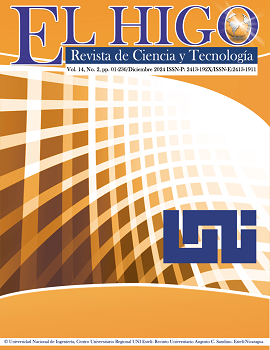Assessment of the consumption and knowledge of the benefits of functional beverages by students of the Higher Polytechnic Agricultural School of Manabí Manuel Félix López, Ecuador
DOI:
https://doi.org/10.5377/elhigo.v14i2.19078Keywords:
Nutritional, quality, safety, assuranceAbstract
Functional foods are constantly evolving in the industry, focusing on improving quality of life from a health perspective. This study evaluated the consumption and knowledge of functional beverages among students at the Escuela Superior Politécnica Agropecuaria de Manabí, Ecuador, to understand their level of knowledge, consumption, and perception of these benefits. Using a quantitative and deductive approach, a semi-structured questionnaire was administered via Google Forms to a sample of 953 students across eight programs, utilizing non-probability sampling and descriptive statistics for analysis. The results indicate that a lack of knowledge about functional foods is directly related to low consumption. In Agroindustry, Veterinary Medicine, and Tourism, 28%, 64%, and 60% of students, respectively, are unaware of the benefits, which corresponds to low consumption rates of 27%, 65%, and 60%. The response variability does not exceed 2%, suggesting a significant relationship between knowledge and consumption. Additionally, 90% of students support nutritional labeling, which influences their purchasing decisions. The low consumption of functional beverages is mainly due to a lack of awareness about their benefits and available options. Encouraging their consumption among university students involves improving information on dietary benefits, implementing nutritional labeling, promoting consumption, and diversifying product offerings within the university environment.
Downloads
917
References
Acosta S. 2023. Los paradigmas de investigación en las Ciencias Sociales: Capítulo 4. 1ed. Lima. Perú. P 60-79. https://doi.org/10.53595/eip.007.2023.ch.4
Al-Nabulsi A, Obiedat R. Knowledge of probiotics and factors affecting their consumption by Jordanian College Students. Int. J. Probiotics Prebiotics 2014; 9: 77–86
Baker MT, Lu P, Parrella JA, Leggette HR Aceptación del consumidor hacia los alimentos funcionales: una revisión del alcance. En t. J. Medio Ambiente. Res. Salud pública. 2022; 19 :1217. https://doi.org/10.3390/ijerph19031217
Bernal D. 2021. Las Escuelas de Líderes Gestores en Soberanía y Seguridad Alimentaria y Nutricional: ¿escenario para la construcción de ciudadanía alimentaria? Tesis. Nutrición Humana. UNC. Bogotá- Colombia. p 30
Concha E. 2020. Plan de negocios para determinar la viabilidad económica, comercial y técnica en la empresa Copacabana Industrial EIRL para el desarrollo de bebidas funcionales a base de frutas cultivadas en la Selva Central. Tesis. Maestría en Administración. ESAN. Lima-Perú. P 24
Coria A. 2023. Los alimentos funcionales como alternativa a las tendencias de consumo de alimentos rápidos. Repositorio de la Red Internacional de Investigadores en Competitividad, 16 (16), 1424–1444
Diaz C. 2023. Artificially Sweetened Beverages and Health Outcomes: An Umbrella Review, Valencia, España. Revista Advance In Nutrition. 14(4): 710-717. https://doi.org/10.1016/j.advnut.2023.05.010
Durán C., Paéz D. y Nolasco C. 2021. Perfiles, retos y desafíos del estudiante universitario en el Siglo XXI, Perfil, retos y desafíos del estudiante universitario en el siglo XXI. bol.redipe [Internet]. 2021 May 1 [cited 2024 Apr. 11];10(5):189-98. Available from: https://revista.redipe.org/index.php/1/article/view/1296
FAO. 2020. Panorama de la Seguridad Alimentaria y Nutricional en América Latina y el Caribe. Santiago de Chile. p 93
Fuentes L. 2015. Alimentos funcionales: impacto y retos para el desarrollo y bienestar de la sociedad colombiana. Bogotá, Colombia.
Revista Biotecnología en el Sector Agropecuario y Agroindustrial 13(2). 140-149.
García M. (2020). Diagnóstico e intervención en psicología de las organizaciones. 1 ed. Bogotá, Colombia. P 57
Global Industry Analysts. 2022. Mercado mundial de alimentos y bebidas funcionales podría alcanzar 218.3 mdd para 2026: estudio. https://enalimentos.lat/noticias/5069-mercado-mundial-de-alimentos-y-bebidas-funcionales-podria-alcanzar-218-3-mdd-para-2026-estudio.html
Gonçalves A. C; Nunes, A. R., Flores-Félix, J. D., Alves, G., y Silva, L. R. (2022). Cherries and blueberries-based beverages: Functional foods with antidiabetic and immune booster properties. Molecules, 27(10), 3294. https://doi.org/10.3390/molecules27103294
Guananga A. 2023. Factibilidad para la creación de una empresa dedicada a la elaboración de bebidas no alcohólicas edulcoradas no carbonatadas en el Distrito Metropolitano de Quito. Tesis. Ciencias Administrativas. UCE. Quito-Ecuador. P 70-74
Kausar H. (2012). Studies on the development and storage stability of cucumber-melon functional drink. Journal of Agriculture Research, 50 (2), 238-248. Estados Unidos
Martínez-Rodríguez, E., y López-Sánchez, P. (2024). Conocimiento nutricional y patrones de consumo de bebidas funcionales en instituciones de educación superior. Journal of Functional Food Studies, 8(1), 112-127.
Muñoz M. 2019. Los negocios del café. 1ed. México. P 131
Parra-Ortega, M., Ramírez-González, J., y Torres-Silva, A. (2023). Tendencias en el consumo de bebidas funcionales entre estudiantes universitarios: Un análisis comprehensivo. Revista Latinoamericana de Nutrición Aplicada, 15(2), 78-93.
Ramírez E. 2020. Estudio de los factores que han influido en el consumo de alimentos funcionales en Colombia en la última década. Tesis. Ingeniería de Alimentos. UNAD. Bogotá-Colombia. P 27
Rico D. 2023. Efectividad de biochar y biofertilizantes en el crecimiento y calidad de plántulas de cacao. Revista Nutrición Clínica en Medicina. Valladolid-España 17(2): 103-118
Roncancio J. J. B. (2023). Educación alimentaria y nutricional en la salud pública. Complejidades y perspectivas. Medicina, 45(2), 284-294. https://doi.org/10.56050/01205498.2239
Suzan T. 2021. A review on packed non-alcoholic beverages: Ingredients, production, trends and future opportunities for functional product development, Istambul, Turkey. Revista Trends in Food Science And Technology. 112(1): 442-454. https://doi.org/10.1016/j.tifs.2021.03.058
Temple, N. J. (2022). A rational definition for functional foods: A perspective. Frontiers in nutrition, 9, 957516
Velásquez P. C; Galeano C. (2023). Lectura, interpretación y uso del etiquetado nutricional en la decisión de compra de adultos de un barrio de Asunción. Revista Científica Ciencias de la Salud; (5)7 https://doi.org/10.53732/rccsalud/2023.e5106
Wang, X., Worsley, A., y Cunningham, E. (2008). Consumers' beliefs and perceptions about food and beverage purchases: A focus on ideological factors. Journal of Consumer Marketing, 25(3), 149-157.
Yilmaz L, Ozcan E, Bayizi A. Assessment of sociodemographic factors, health status and the knowledge on probiotic dairy products. Food Sci Human Wellness. 2020; 9(3): 272-279 https://doi.org/10.1016/j.fshw.2020.05.004
Zamora, I., y Barboza, Y. (2020, June). Consumo de alimentos funcionales por estudiantes universitarios ecuatorianos. In Anales venezolanos de nutrición (Vol. 33, No. 1, pp. 14-23). Fundación Bengoa.
Downloads
Published
How to Cite
Issue
Section
License
Copyright (c) 2024 Universidad Nacional de Ingeniería

This work is licensed under a Creative Commons Attribution-NonCommercial-NoDerivatives 4.0 International License.





